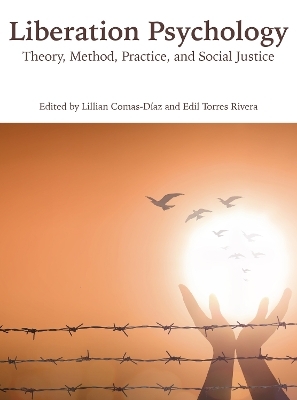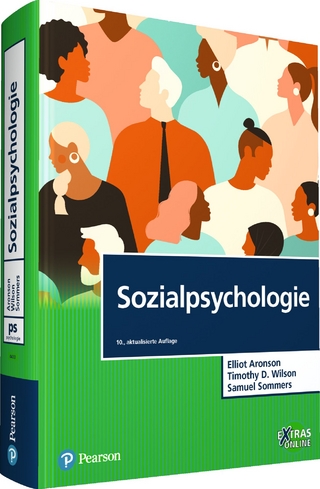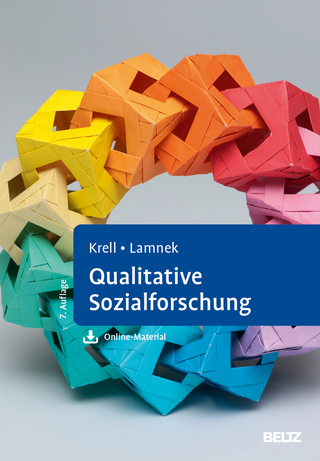
Liberation Psychology
American Psychological Association (Verlag)
978-1-4338-3208-6 (ISBN)
- Lieferbar (Termin unbekannt)
- Versandkostenfrei innerhalb Deutschlands
- Auch auf Rechnung
- Verfügbarkeit in der Filiale vor Ort prüfen
- Artikel merken
This book guides readers through the origins, development, and key concepts of liberation psychology; its methods, including participatory action research; its manifestation in clinical practice; its potential future applications; and its relation to social activism and social justice movements.
Liberation psychology challenges traditional Western‑based psychology by offering an emancipatory approach to understanding and addressing oppression among individuals and groups. This book provides an understanding of liberation psychology that enhances the work of all students, researchers, and practitioners in psychology by raising awareness of discrimination, inequality, and issues related to intersectionality; affirming cultural identities; fighting oppression; and promoting social change to help alleviate human suffering and support fairness, equality, and justice.
The insights provided into liberation psychology's concepts of critical consciousness, empowerment, and social justice action can enhance the well‑being of individuals and improve lives.
Lillian Comas-Diaz, PhD, is a clinical psychologist in private practice and a clinical professor in the Department of Psychiatry and Behavioral Sciences at George Washington University. The author of over a hundred publications, Dr. Comas-Díaz is also the coeditor of Latina Psychologists: Thriving in the Cultural Borderlands, Womanist and Mujerista Psychologies, and Psychological Health of Women of Color. Dr. Comas-Díaz is the founding editor of Cultural Diversity and Ethnic Minority Psychology, the official journal of the Society for the Psychological Study of Ethnic Minority Issues (Division 45 of the American Psychological Association). She is an associate editor of the American Psychologist. Edil Torres Rivera, PhD, is a professor in the Department of Counseling, Educational Leadership, Educational and School Psychology; and Director of the Latinx Studies program at Wichita State University, Kansas. His primary research focuses include complexity and the use of indigenous healing techniques as a necessary element in psychological work with ethnic minority populations in the United States. He serves on the editorial board of the Journal for Social Action in Counseling and Psychology and is the editor of the Interamerican Journal of Psychology.
Series Foreword
Frederick T. L. Leong
Foreword: How APA Has Promoted Social Justice
Melba J. T. Vasquez
Introduction
Edil Torres Rivera and Lillian Comas-Díaz
Part I. Liberation Psychology Theory
1. Liberation Psychology: Origins and Development Mark Burton and Raquel Guzzo 2. Concepts of Liberation Psychology Edil Torres Rivera 3. Liberation Psychology and Racism Raúl Quiñones-Rosado
Part II. Liberation Psychology Method
4. From Freud to Fanon to Freire: Psychoanalysis as a Liberation Method Daniel Gaztambide 5. Liberation Psychology of and for Transformative Justice: Centering Acompañamiento in Participatory Action Research Jesica Siham Fernández 6. Feminist Participatory Action Research: Coconstructing Liberation Psychological Praxis Through Dialogic Relationality and Critical Reflexivity M. Brinton Lykes and Gabriela Távara
Part III. Liberation Psychology Clinical Practice
7. TestimoniosAlejandro Cervantes 8. Urban Liberation: Postcolonial Intersectional Feminism and Developing a Socially Conscious Therapeutic Practice Chakira M. Haddock-Lazala 9. Liberation Psychotherapy Lillian Comas-Díaz
Part IV. Liberation Psychology and Special Populations
10. Black Minds Matter: Applying Liberation Psychology to Black Americans Thema Bryant-Davis and Shavonne J. Moore-Lobban 11. Liberation Psychology and LGBTQ+ Communities: Naming Colonization, Uplifting Resilience, and Reclaiming Ancient His-stories, Her-stories, and T-stories Anneliese A. Singh, Brean’a Parker, Anushka R. Aqil, and Falon Thacker 12. Transnational Feminist Liberation Psychology: Decolonizing Border Crossings Kathryn L. Norsworthy and Ouyporn Khuankaew
Part V. Liberation Psychology Social Action
13. Liberation Psychology, Creativity, and Arts-Based Activism and Artivism: Culturally Meaningful Methods Connecting Personal Development and Social Change Ester R. Shapiro 14. Liberation, Inspiration, and Critical Consciousness: Preparing the Next Generation of Practitioners Carrie Castañeda-Sound, Daryl M. Rowe, Nahaal Binazir, and Marlene L. Cabrera
Conclusion. Liberation Psychology—Crossing Borders Into New Frontiers Lillian Comas-Díaz and Edil Torres Rivera
| Erscheinungsdatum | 01.09.2020 |
|---|---|
| Reihe/Serie | Cultural, Racial, and Ethnic Psychology Series |
| Verlagsort | Washington DC |
| Sprache | englisch |
| Maße | 178 x 254 mm |
| Themenwelt | Geisteswissenschaften ► Psychologie ► Sozialpsychologie |
| ISBN-10 | 1-4338-3208-9 / 1433832089 |
| ISBN-13 | 978-1-4338-3208-6 / 9781433832086 |
| Zustand | Neuware |
| Haben Sie eine Frage zum Produkt? |
aus dem Bereich


